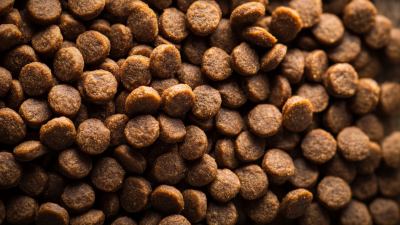In recent years, pet owners have increasingly turned to Natural Dog Chews as a healthier alternative to traditional chews and treats. According to a survey by the American Pet Products Association, 67% of American households now own a dog, and many of these pet parents are becoming more conscious about the nutritional and health benefits of the products they select for their furry companions. Natural Dog Chews not only help maintain dental health by reducing plaque and tartar buildup, but they also provide essential nutrients that support overall wellness. In fact, a study published in the Journal of Animal Science found that dogs who regularly consumed natural chews had improved digestive health and a lower risk of obesity-related issues. With the plethora of options available, it’s crucial for pet owners to understand how to choose the best Natural Dog Chews that align with their pets' dietary needs and health conditions, ensuring a happy and healthy lifestyle for their canine companions.

When considering the nutritional benefits of natural dog chews, it's essential to focus on options that not only satisfy your pet's chewing instincts but also contribute to their overall health. Chews made from single ingredients, such as beef trachea or water buffalo, are excellent choices as they are high in protein and filled with essential nutrients. These natural dog chews promote dental health by effectively reducing plaque and tartar buildup, all while giving your dog a delicious treat they can enjoy.
As pet owners become more conscientious about their dogs' diets, trends in healthy treats highlight the importance of clean ingredients. For example, treats infused with antioxidants, like blueberry chews, offer additional health benefits, helping to combat free radicals and support your dog's immune system. Additionally, many brands are creating low-calorie options that allow you to reward your furry friend without the guilt of added calories. By choosing high-quality, natural chews, you contribute to your dog’s well-being while ensuring they relish every bite.
When selecting natural dog chews, it's essential to consider the various types available and their pros and cons. For instance, antlers are popular among dog owners due to their long-lasting nature, but they also come with risks such as potential tooth fractures. Similarly, bully sticks offer a high-protein option that many dogs find irresistible, yet they can be controversial due to their animal origin. Always check for potential allergens and monitor your dog for any adverse reactions when introducing new chews.
To make the best choice for your pet, consult your veterinarian for recommendations tailored to your dog's size, breed, and health conditions. Additionally, make sure to supervise your dog while they're enjoying their chews to prevent choking or other injuries. It's also wise to rotate different types of chews to keep your dog engaged and provide a variety of nutritional benefits. By weighing the advantages and disadvantages of each option, you can find the ideal natural chews that contribute to your dog's dental health and overall well-being.
When it comes to choosing the best natural dog chews, ingredient quality is paramount. Recent studies indicate that the nutritional composition of dog chews can significantly impact your pet's health and well-being. For instance, chews made with high-quality proteins and natural preservatives not only promote dental health but also contribute to overall nutrition. A report from a leading veterinary association highlighted that chews with natural ingredients provide better digestibility and nutrient absorption for dogs, helping to avoid gastrointestinal issues that commonly arise from artificial additives.
When comparing popular dog chew brands, the focus should be on the source of their ingredients. Brands that prioritize whole, single-source proteins tend to yield chews that are more beneficial for canine health. For example, chews made from grass-fed beef or wild-caught fish have been shown to contain higher levels of Omega-3 fatty acids, which are essential for maintaining a shiny coat and healthy skin. According to pet nutrition experts, selecting chews with minimal processing ensures that your dog receives maximum flavor and nutritional content, reducing food allergies and sensitivities. Understanding the ingredient sourcing and quality can help dog owners make informed choices for their furry companions.
When choosing natural dog chews, evaluating their durability and safety is crucial for your pet’s health. According to the American Kennel Club, durable chews can significantly reduce the risk of dental issues, with certain natural options proving to be more resilient than others. For instance, chews made from buffalo or venison horns have shown to last longer against heavy chewing, which means less wear on your dog's teeth and a lower chance of ingestion of hazardous fragments.
Safety is another paramount concern when selecting dog chews. A 2022 report from the Veterinary Oral Health Council indicated that chews made from all-natural ingredients, free from artificial additives and preservatives, pose the lowest health risks. It's advisable to avoid popular options like rawhide, which can splinter and cause gastrointestinal blockages. Instead, consider chews like sweet potato, carrots, or antlers, which have shown not only to be safer but also to promote better dental hygiene. Always monitor your pet while they enjoy their chews to ensure they don’t break into small pieces that could present choking hazards.

When selecting the best natural dog chews for your pet, understanding the right size and texture is crucial for a satisfying and safe chewing experience. A chew that is too small can pose a choking hazard, while one that is too large may discourage your dog from engaging with it at all. It's important to consider your dog's size, breed, and chewing habits. For instance, larger breeds may require thicker, sturdier chews to withstand their strong jaws, while smaller breeds may prefer softer, more easily manageable options that they can chew without strain.

In addition to size, the texture of the chew should relate to your dog's individual chewing preferences. Some dogs prefer softer chews that are easy to break down, while others thrive on tougher, more durable textures that challenge their chewing instincts. Consider offering a variety of textures to see what your dog enjoys most. You might find that they gravitate towards chews that offer different experiences, such as a rough exterior for scraping teeth clean or a more porous composition that can help with dental health. Observing your dog's interactions with different chews can guide you in making informed choices that cater specifically to their needs and preferences.





